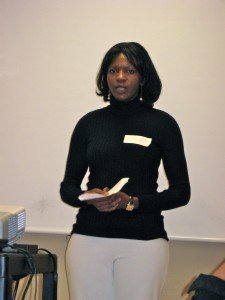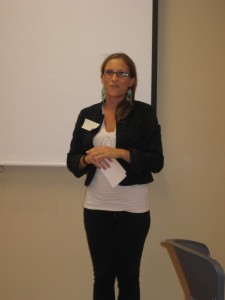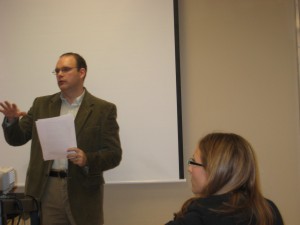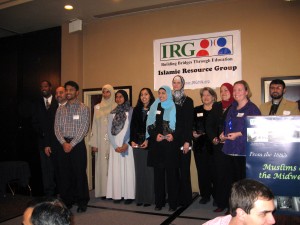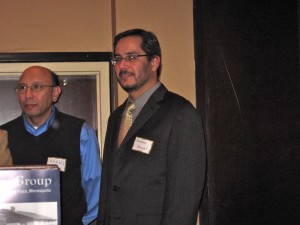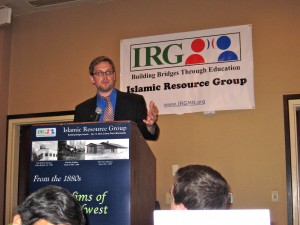Two years ago today – it was the day after Labor Day, 2008 – eight of us got up very early, and made our way over to Concordia University in St. Paul, to make final preparations for, and open, the Peace Island Conference, sponsored by the Minnesota Alliance of Peacemakers.
It turned out to be a very successful event. Something like 400 people registered for all or part of the conference; there were 23 major speakers**, and 31 exhibitors. Subsequent evaluations were very positive. It was probably one of the more successful, as articulated in the program booklet, “Peace, Justice, Harmony, the Environment and Global Issues” conferences ever held in the Twin Cities.
I ‘see’ this conference every time I go into my garage. The Peace Island box is in clear view and, like any archive, gathering dust..

Peace Island archive
An immense amount of planning and hard work went into the conference. There were nine on our committee*, two of us were laid low for extended periods of time by serious illness. All but one of us were retired people.
Peace Island started out with a dream of Susu Jeffrey, a Twin Citian who envisioned St. Paul’s Harriet Island as an island of peace during the Republican National Convention. I’m not certain when she first had her dream, but it began to take shape in a conversation with Dennis Dillon at a conference of Network of Spiritual Progressives in Minneapolis in mid-October, 2006. Not long after, a few of us jumped on board and (each of us probably thought at one point or another) didn’t have the good sense to jump off the conference ‘train’ until it was ‘running too fast’. Dreams don’t just come true – they take a lot of passion and effort.
As with everything else, every word in the title of the conference was (even though we were generally peaceful people) fought over.
The crucial element in this conference, we all agreed, was that it be positive and constructive – a “
Solutions Driven Conference” – and that is how we billed ourselves, and how we encouraged our speakers to frame their presentations.
At this link
Peace Island 9-2008001 is the tattered cover of my conference program, along with two Peace Island buttons – our official presentation of the conference.
It was difficult, we learned, to keep people focused on Solutions. It is far, far easier to focus on Problems. To actually accomplish Solutions requires lots of efforts on one’s part; a Problem can easily be ignored or cast off onto someone else – it’s THEIR problem.
I have thought a great deal about ‘solutions’ since our conference ended on September 3, 2008.
Two months after the conference closed Barack Obama was elected President of the United States, and there was – very clearly – an unrealistic expectation placed on him to not only solve the abundant problems awaiting him, but to solve them yesterday. The worst financial crisis in living memory exploded two weeks after our conference adjourned; the United States economy virtually imploded before the time that the new President took office in January, 2009, and it’s been a rough ride ever since. Pres. Obama and the new Congress inherited a very, very sick national ‘horse’.
I’m sure we’re all looking for “solutions”, but I often wonder about our expectations, particularly on ourselves, as the essential agents of Change.
I wonder, too, about our standards for judging that Change: Is accomplishing something positive, even some little thing, better than nothing? Or is there some invisible and unstated criteria that whatever has been accomplished is too little, and that the only adequate solution is immediate gratification of what we want…accomplished by someone other than ourselves.
Rabbi Michael Lerner, visionary leader of Network for Spiritual Progressives (NSP), was the speaker at that October, 2006, conference where Susu and Dennis had their first conversation about Peace Island. I’d guess that all of us on the committee were at that conference as well. In an editorial in the September/October 2010 issue of NSPs magazine, Tikkun, Rabbi Lerner makes a statement I think needs to be the operating philosophy of those wanting positive change in this country: “…
we…need to do the mass educational work…and [become] involved with our work to advance these ideas.”
Check out NSP
here, and as Gandhi so famously said, become the change you wish to see in the world.
* – The Committee (in alpha order): Dick Bernard, John and Marie Braun, Dennis Dillon (chair), Rebecca Janke, Susu Jeffrey, Ann Lewis, Bob Milner, Verlyn Smith
** – Speakers: Ron Bowen, Leslie Cagan, Matthew Commers, Susan Cornell Wilkes, Marv Davidov, Mel Duncan, Sara Flounders, Bruce Gagnon, Terry Gips, Jim Harkness, Anne Hastings, Lili Herbert, Susan Hubbard, Douglas A. Johnson, Antonia Juhasz, Kathy Kelly, Richard LaFortune, Lisa Ledwidge, Ray McGovern, Bharat Parekh, Sami Rasouli, Coleen Rowley, Sandy Spieler, Starhawk, Kaia Svien, Ami Voeltz, Kevin Winge, Ann Wright



